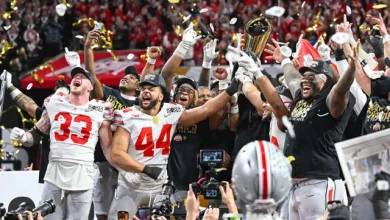Justified or not, Arch Manning’s talent and leadership significantly contribute to Texas being preseason No. 1, fueling high expectations for the Longhorns’ upcoming season.

In the world of college football, preseason rankings often generate intense debate, with analysts, fans, and players eagerly speculating about which team will reign supreme come postseason. The Texas Longhorns, a storied program with a rich history, have entered the 2024 season as the preseason No. 1 team in the country—a position that brings both excitement and scrutiny. Central to this narrative is the hype surrounding quarterback Arch Manning, a five-star recruit and one of the most talked-about prospects in recent years.
The question arises: Is it justified that Manning’s talent and leadership are major reasons behind Texas’s top ranking? Or are other factors more influential? To answer this, we need to analyze Manning’s individual impact, the team’s overall composition, coaching strategies, recruiting success, and the broader college football landscape. This comprehensive review will explore whether placing the lion’s share of Texas’s preseason optimism on Manning is justified, and what it means for the Longhorns’ season prospects.
The Context: Texas Longhorns’ Rise and Expectations
1. Historical Perspective and Recent Success
Texas has long been considered one of college football’s premier programs, with multiple national championships, a passionate fan base, and a tradition of producing NFL talent. However, in recent years, the team faced challenges in returning to national prominence, with coaching changes, roster rebuilds, and increased competition creating hurdles to sustained success.
2. The 2024 Preseason No. 1 Ranking
Heading into 2024, the Longhorns’ ranking reflects a combination of factors: a talented roster, coaching stability under Steve Sarkisian, strategic recruitment, and a perceived trajectory toward national contention. While the team’s overall strength is undeniable, much of the media attention centers on quarterback play, especially the arrival of Arch Manning, nephew of NFL stars Peyton and Eli Manning.
3. The Significance of a Star Quarterback
In college football, the quarterback position is often the most influential on the field, and a highly-touted recruit like Manning instantly elevates expectations. His reputation as a generational talent fuels optimism that Texas can compete at the highest level, possibly even securing a national championship.
Who Is Arch Manning? Background and Expectations
1. Recruiting Profile and Hype
Arch Manning was the top-ranked quarterback in his class, celebrated for his arm strength, decision-making, football IQ, and leadership qualities. His recruitment was a national story, with many considering him the potential face of college football for years to come.
2. Family Legacy
Manning’s family background adds to the narrative—his grandfather Archie Manning, and uncles Peyton and Eli Manning, are legendary NFL quarterbacks. Expectations are that he inherits a combination of athletic talent and football intelligence, making him a potential game-changer.
3. Transition to College Football
Manning’s initial performances, leadership in practice, and early integration into Texas’s offensive schemes have been closely watched. While he’s still developing, early signs suggest he possesses the poise and skill necessary to succeed at the college level.
Is Manning’s Talent Justification for Texas’s Top Ranking?
1. On-Field Ability and Potential
Manning’s talent is widely acknowledged as exceptional. His arm strength, accuracy, mobility, and football intelligence give him the tools to be an elite college quarterback. If he reaches his projected ceiling, his impact on Texas’s offense could be transformative, elevating the team’s overall performance.
2. Immediate Impact and Development
While some critics argue that true freshmen often struggle to make an immediate impact, Manning’s maturity and preparation could allow him to contribute early. His leadership qualities also set him apart, potentially galvanizing the team around him.
3. Leadership and Confidence
A quarterback’s leadership can rally a team, especially in high-pressure situations. Manning’s poise and confidence are essential ingredients for Texas’s success, particularly in shaping a cohesive, motivated unit.
4. The Role of Supporting Cast and Coaching
While Manning’s talent is undeniable, football is a team sport. The effectiveness of Texas’s offensive line, skill position players, and coaching staff will significantly influence how much Manning’s talent translates into wins. Nonetheless, a quarterback of his caliber can elevate the entire team.
Are Other Factors Contributing to Texas’s No. 1 Status?
1. Defensive Improvements
Texas has invested heavily in its defense, recruiting talented players and emphasizing a more aggressive, disciplined approach. A strong defense reduces the pressure on Manning and the offense, increasing the team’s chances of winning games.
2. Offensive Line and Skill Players
A solid offensive line, complemented by talented skill-position players, creates an environment where Manning’s abilities can flourish. The development of receivers, running backs, and tight ends adds layers of dimension to Texas’s attack.
3. Coaching and Strategy
Steve Sarkisian’s offensive schemes are designed to maximize quarterback talent. His experience and strategic acumen are crucial in developing Manning’s potential and crafting an effective game plan.
4. Overall Talent and Depth
Recruiting classes over recent years have bolstered Texas’s roster, creating depth and competition. This environment fosters player development and resilience, contributing to the team’s high expectations.
The Justification: Is Manning the Main Reason for the No. 1 Ranking?
1. Correlation Between Manning’s Talent and Team Success
Given the importance of quarterback play in college football, it’s reasonable to argue that Manning’s talent is a primary factor in Texas’s top ranking. His presence raises the team’s ceiling, giving them a legitimate shot at national dominance.
2. Leadership and Intangibles
Manning’s leadership qualities can inspire teammates, elevate performance, and instill confidence—elements that are difficult to quantify but vital for a championship-caliber team.
3. The Perfect Storm of Factors
While Manning is a key piece, his impact is amplified by a talented supporting cast, strategic coaching, and a motivated team. His arrival acts as a catalyst that brings these elements together.
4. Historical Precedent
Historically, teams with elite quarterbacks often secure preseason top spots and contend for national titles. Manning’s talent aligns with this pattern, supporting the idea that he is a justified central reason for Texas’s lofty ranking.
Counterarguments: Is It Overstated?
1. Overreliance on a Freshman
Some critics argue that placing too much emphasis on Manning’s potential overlooks the importance of experience and team cohesion. Freshmen quarterbacks can face adaptation challenges, and success depends on multiple factors.
2. The Role of the Entire Team
Football is a team sport; a single player, even a quarterback of Manning’s caliber, cannot carry a team alone. Factors like defense, special teams, and coaching adjustments play pivotal roles.
3. Preseason Rankings Are Speculative
Preseason rankings are inherently speculative. While Manning’s talent justifies optimism, actual season performance can differ due to injuries, scheme adjustments, or unforeseen circumstances.
The Broader Impact: Expectations and Realistic Outcomes
1. Elevated Expectations
Manning’s arrival has set high expectations among fans and media. While these create excitement, they also increase pressure on the team and coaching staff.
2. Season Outlook
If Manning adapts quickly and performs at a high level, Texas could contend for a national championship. Conversely, if he faces struggles or injuries, the team’s aspirations might be tempered.
3. Long-Term Implications
Manning’s development over the season will influence recruiting, team culture, and the program’s trajectory. His leadership could inspire future recruits and establish Texas as a perennial contender.
Justified or Not?
In summary, it is largely justified to credit Arch Manning’s talent and leadership as major reasons why Texas is preseason No. 1. His exceptional skill set, football IQ, and intangibles provide a significant boost to Texas’s championship aspirations. His arrival elevates expectations, energizes the fan base, and aligns with historical patterns where elite quarterbacks lead teams to national prominence.
However, it is essential to recognize that football success depends on a confluence of factors: a strong supporting cast, effective coaching, strategic execution, and team resilience. Manning’s impact, while substantial, is part of a broader ecosystem that determines the team’s ultimate performance.
If Manning fulfills his promise and integrates seamlessly into Sarkisian’s system, Texas’s No. 1 ranking could be justified. Conversely, unexpected setbacks or underperformance could temper initial optimism. Ultimately, Manning’s talent and leadership are central pillars supporting Texas’s lofty perch, and much of the team’s success hinges on how well he leverages his potential in the upcoming season.









